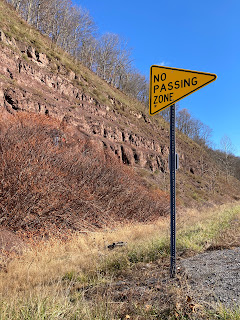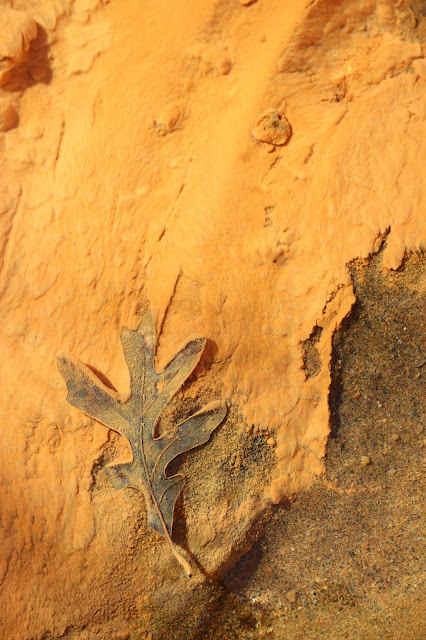This Is Why We Can’t Have Nice Things
Red Hill, in Pennsylvania, is famous as a rare fresh-water
site from the Devonian. In its layers are the
remains of huge ray-finned and
lobe-finned fish, as well as the first tetrapods.
The site is a sheer wall of hard shale and sandstone. At the base, the soft scree is deep and hard to traverse. Above it is a wall that a mountain goat would have to traverse carefully, with constantly shifting sand raining down. Standing at the base for a few minutes, even on a calm day, you are bound to hear the sound of sediment pouring down the wall from random loose spots. The wall is prone to lands slides all on its own.
I've been fossil hunting for 20 years. When I first saw where I was going to be working, I thought, "You have got to be kidding me!"
The wall overlooks a narrow, two-lane road. The road is
bounded on the outcrop side by a steep ditch. On the opposite side of the road,
the hill drops off drastically into a river gorge. The north end of the wall
curves around to create a blind spot for oncoming traffic.
No one knew that there were fossils there until 1993 and the
site was closed by 2020. Why? According to the Red Hill Field Station, someone
thought it would be a good idea to take a jack hammer to the wall. This person
let loose a huge block of stone that rolled out of control into the road. Fortunately,
the person with the jack hammer didn’t fall to their death while breaking the
wall, and no travelers were hurt or killed by the rockfall. It just ended up a
huge mess for Penn DoT to clean up while traffic on an important local corridor
was blocked. They closed the site and severely restricted permits.
Recently, my friends and I got coveted permits to look for
whatever we could find, with the intention of giving anything scientifically
important to the field station for their ongoing research. Anything we could
keep for ourselves is getting used for personal research, educational outreach,
etc. It’s not just going to a useless hoard. It took the lead couple six or
eight weeks to get those permits. And we found stuff. Some of it might even be
important, but we won’t know until we have time to sort it out.
We had two days to pull what we could find. Day 1 was more
surveying than excavating. The rock is slow to work. The fossils are delicate.
All of us had excavation work that needed to be continued the next day.
As night fell and we were packing up for the day, we were
joined by a stranger with a headlamp. She went up to the same level we were
exploring and started picking her way across the wall, looking for exposed
fossils. She ignored our suggestions that she ought to have a permit and do
this in daylight. So, one of us carefully led her away from one of our unmarked
excavation spots before she noticed it while another removed all of our flags.
Then we just hoped that it would all be there in the morning -- without a dead
body at the bottom of the hill.
The next day, at about the same time in the evening that the
poacher showed up, a couple of park rangers showed up and asked to check our
permits. We handed them over and chatted briefly. We also mused to them, “Why
couldn’t you have showed up yesterday?”
If you ever get upset about sites closing, groan about
imposing restrictions on collecting, and/or are tempted to trespass to find
treasures, consider why the place may have closed to the general public and
whether it was someone like you who was the catalyst.




Comments
Post a Comment